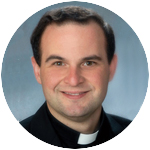
Father Eric J. Banecker
We are approaching the conclusion of what, for many of us, has to amount to the strangest summer of our lives. It’s not just that this one felt especially shorter than the others that came before them; even more, it’s the disconcertingly forced nature of this summer.
We have tried our best to fill it with the usual activities. But we normally don’t wear masks at BBQs. Hockey is never played in August. Baseball doesn’t schedule seven-inning regular season games.
In major American cities, a combination of the coronavirus pandemic and the riots of early summer have left entire neighborhoods desolate. Normally humming business districts feel like ghost towns. Everyone has left, but where, exactly, have they gone?
This isolating, unnerving year has led, unsurprisingly, to negative health outcomes. Young adults in particular have reported high levels of anxiety and depression in the last six months. And this is a generation which faced serious mental health struggles already.
[hotblock]
As someone around my age remarked to me recently: our generation came of age during 9/11 and the Middle Eastern conflicts, then we tried to get jobs during the great recession, and now many are trying to start families during the great pandemic.
The remark is prescient, but it does not tell the whole story. After all, previous generations faced much worse than this. The “Greatest Generation” truly lived through times that would make me crawl up in a ball. Imagine those who lived through the turmoil of the French Revolution and Napoleonic Wars or who saw the Bubonic Plague rip through town.
Yes, Millennials have lived through challenging, stressful, even dystopian times. But they are not in themselves unprecedented.
What ails us all — no matter our age — is our tendency to allow the immediate here-and-now problems of the world to take our peace away and knock us off the path of discipleship.
Yes, the coronavirus in stressful and frightening. The idea of dying alone in a hospital is a painful one for ourselves or those we love. And the flurry of information, misinformation, and updated guidance makes everything seem worse than it is, or at least more overwhelming.
But we as Catholic Christians know the cure for fear and isolation, and it’s not reading just one more news article or chart (trust me, I’ve tried!). It’s not done by indulging our fears or numbing ourselves with substances. What we need is to re-dedicate ourselves to growing in our interior life. The initial lockdown brought this home in a powerful way.
We should not forget the great gift of the pandemic — yes, the gift! It reminds us to focus on what is most essential in life. And, indeed, it forces us to seek joy and happiness without the normal means of human interaction.
Now, of course, we have figured out ways of getting together with some people while assuming minimal risk, and that is a good thing. But we should not forget the graces of the lockdown. And we should try to recover them now. They are the building blocks of not just a renewed interior life for an individual, but of a restored society, darkened by decadence and mediocrity.
Devotion to the Word, the Blessed Mother, and the saints has carried many people through this long night. Many have been witnesses to me of a profound love and desire for the Eucharist when they have been unable to participate in it. The way many have so generously given of their time, talent, and treasure to help those in trouble should inspire us all.
Above all, we should cultivate time for silence, so that we may hear the whisper of God. Our lives have become too hectic, too frenetic to listen to his voice as we should. Replacing in-person activities with virtual activities doesn’t help either. Instead, what will help us is to put away the phone with its cacophony of ads, voices, and e-mails that seem important.
May we enter into silence and contemplation, that we may hear the whisper of God who calls us to renewal even in this summer of our discontent.
***
Father Eric J. Banecker is parochial administrator of St. Francis de Sales Parish, Philadelphia.
PREVIOUS: Visiting an open church is vital because we need sacred spaces
NEXT: Here come the elections — a time for love and humility



Share this story